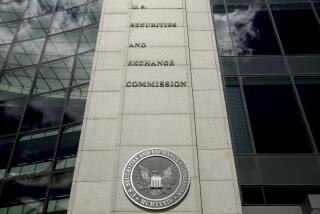2 Testify in Business Week Insider Trial : Securities: A printer and his broker said they were unaware that trading on tips gleaned from advance copies of the magazine was illegal.
- Share via
The first two men to stand trial in the nationwide Business Week insider trading scandal took the stand Monday in U.S. District Court in Los Angeles, both claiming they were unaware that what they had done was illegal.
The Securities and Exchange Commission has charged in a civil insider-trading lawsuit that Brian J. Callahan, a former broker in the Anaheim office of Prudential-Bache Securities, and William N. Jackson, a former quality-control analyst at a Torrance printing plant, got early copies of Business Week and then bought stock based on recommendations in the magazine’s “Inside Wall Street” column.
The SEC claims that Callahan, 30, of Anaheim, and several brokerage clients made $19,684 in illegal profits while Jackson and two of his brothers racked up $19,506 in ill-gotten gains. Jackson and Callahan, however, are the only two defendants named in the SEC lawsuit, which is seeking to recover damages equal to three times the amount of profits the two men made.
This one of several apparently unrelated cases around the country in which the SEC alleges that several individuals made illicit trades using advance information from a Business Week stock column. This is the first of the cases to go to trial.
Jackson, 34, of Long Beach, testified Monday that he did pick up a copy of Business Week at his employer--R. R. Donnelley & Sons--at about 2 a.m. on Thursday mornings between September, 1987, and July, 1988. He said he would then read the magazine--including “Inside Wall Street”--and place orders through Callahan several hours later after the stock markets opened in New York.
“I traded Business Week stocks to try and make money,” Jackson testified. “Nobody said it was illegal.”
SEC attorneys showed Jackson a copy of a confidentiality agreement he signed that forbade him from trading on information he learned from the company’s financial printing business. Donnelley had posted numerous warnings to employees around its plant about insider trading, the SEC said.
Jackson said he never saw those posters and said he didn’t think that Business Week was considered financial printing because Donnelley didn’t increase its security provisions, such as cordoning off certain areas, when producing the magazine as it did with annual reports or proxy statements.
He further testified that he noticed the prices of stocks in the magazine’s column often went up on Thursdays when he was buying the stock, so he assumed that the recommendations he was using were public knowledge and not inside information.
“I was sure it had reached the public because the stock prices went up at least one dollar in some cases,” Jackson said. “It was clearly legal.”
Meanwhile, Callahan testified that he thought Jackson was getting the recommendations from a computer program. He said he didn’t know where Jackson worked until just a few weeks before he was questioned by the SEC in the summer of 1988.
“The stock broker is first and foremost an order taker,” Callahan told jurors.
But Jackson and a mutual friend--who introduced the two men--both testified that they had told Callahan about Donnelley and the early copies of Business Week. Callahan said they were “lying.”
More to Read
Inside the business of entertainment
The Wide Shot brings you news, analysis and insights on everything from streaming wars to production — and what it all means for the future.
You may occasionally receive promotional content from the Los Angeles Times.










